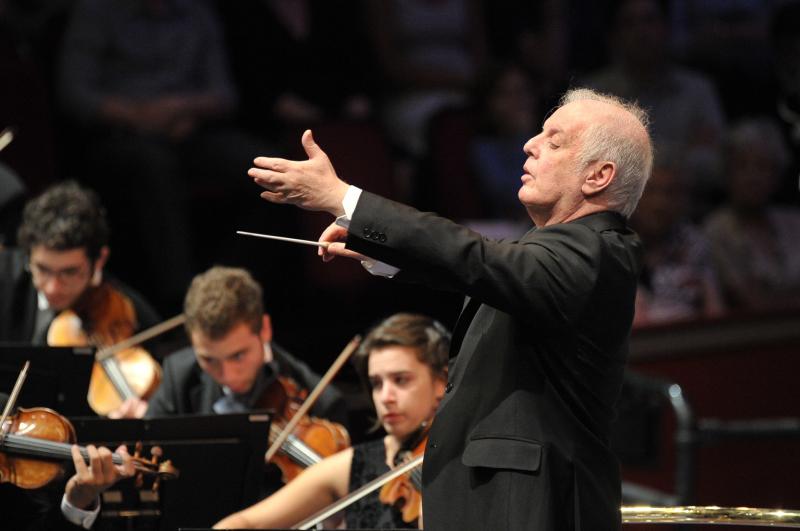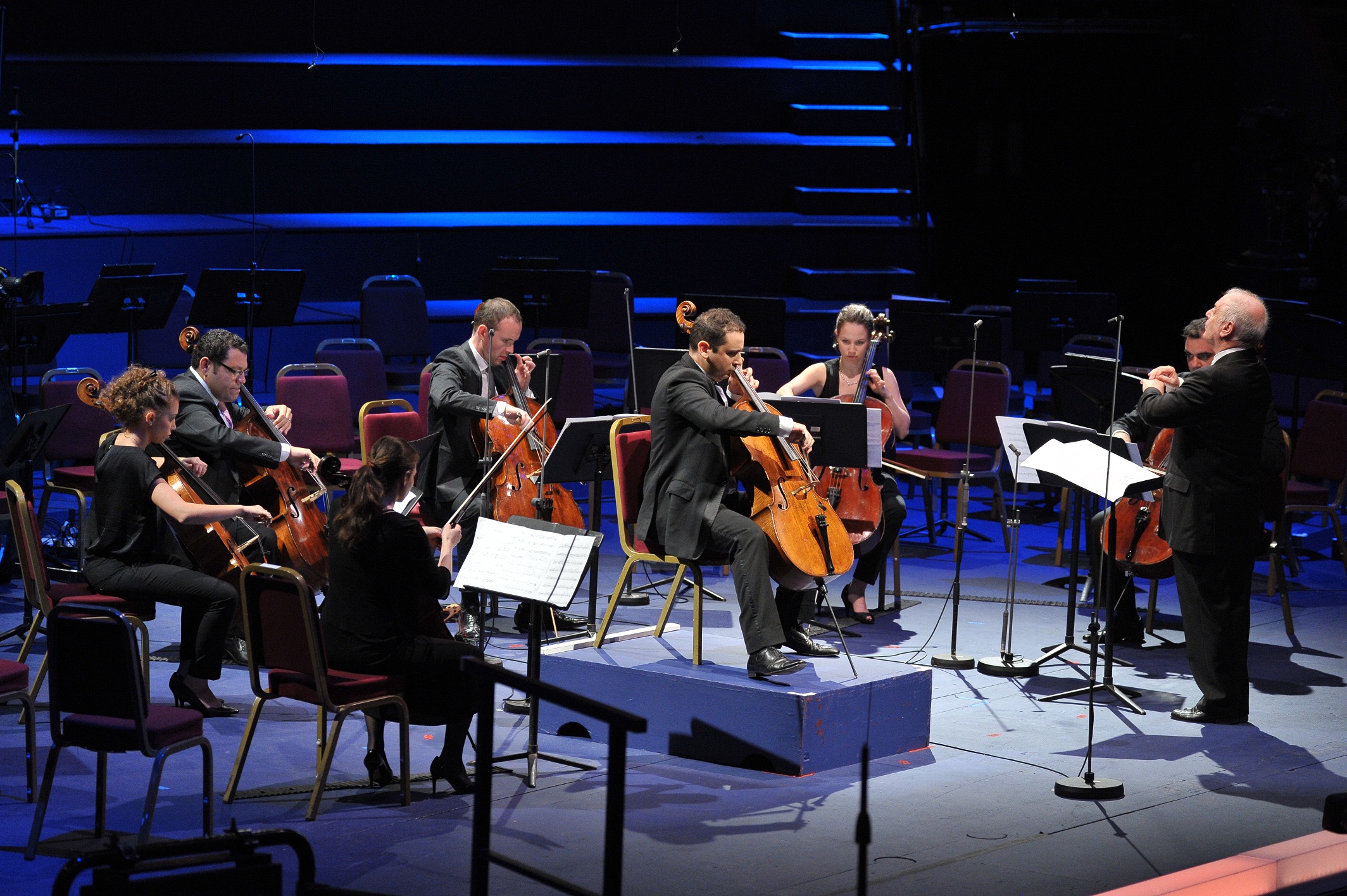BBC Proms: West-Eastern Divan Orchestra, Barenboim (Concert 3) | reviews, news & interviews
BBC Proms: West-Eastern Divan Orchestra, Barenboim (Concert 3)
BBC Proms: West-Eastern Divan Orchestra, Barenboim (Concert 3)
Heavyweight Beethoven proved leaden-footed at times

We’ve had more than our fair share of Beethoven symphonies in London recently. But with the Proms’s monolithic Daniel Barenboim cycle now midway through, memories of Riccardo Chailly and John Eliot Gardiner are being steadily blotted out. Gone are the frisky tempos, the lightness of touch, and in their place we’re being reintroduced to Beethoven the heavyweight.
The first movement of Beethoven’s Symphony No 6 may be marked “Allegro non troppo”, but the composer’s in-built caveat against high speeds surely doesn’t imply quite the ponderous plod that Barenboim took his West-Eastern Divan Orchestra on last night. Muting the volume to match the sedate tempo (what is the point in performing Beethoven with a large contemporary orchestra in the Royal Albert Hall and then dampening them down continually to such extremes of softness?), he offered us a Pastoral Symphony without the dirt, a countryside vision free from weeds, eyesores and any discernable life.
It was joyous and comedic, but felt like an arrival we hadn’t quite earned in the earlier orchestral travails
Beethoven’s brook (perhaps the topical victim of eutrophication) didn’t babble so much as trickle sluggishly, despite a gorgeous moment of watery mischief from the bassoon. There was a storm, but one whose sudden lurch of volume left it struggling to transition back into the pastel landscape and cardboard peasantry Barenboim had painted all around it. The wind fluted and fluttered with charm and colour, but couldn’t escape from the cage of dull strings that surrounded them.
We fared rather better with the Fifth, and as soon as its rather brisker opening and incisive tone were established Barenboim’s earlier restraint made more sense. Reading the two symphonies as the pair that they are he crafted a single emotional arc – releasing everything in the Fifth that he had withheld in the Sixth, making public and explicit all that had previously been celebrated privately. It’s a legitimate and bold approach, but one that I couldn’t help sacrificed the Sixth as collateral damage in order to rise that much more spectacularly to glory in the Fifth.
 There was clarity undoubtedly, and some textural moment of supreme invention (the bassoon once again rising out above the strings in avuncular commentary), but while Barenboim proved himself a skilled manipulator of balance, his bigger gestures lacked proportion. After an Andante con moto of only moderate warmth (despite the eight double basses rising high above the orchestra, who came into their own in the fugal section of the Allegro) we moved into a closing Allegro of almost pantomime brightness. It was joyous and comedic, but felt like an arrival we hadn’t quite earned in the earlier orchestral travails.
There was clarity undoubtedly, and some textural moment of supreme invention (the bassoon once again rising out above the strings in avuncular commentary), but while Barenboim proved himself a skilled manipulator of balance, his bigger gestures lacked proportion. After an Andante con moto of only moderate warmth (despite the eight double basses rising high above the orchestra, who came into their own in the fugal section of the Allegro) we moved into a closing Allegro of almost pantomime brightness. It was joyous and comedic, but felt like an arrival we hadn’t quite earned in the earlier orchestral travails.
During Barenboim’s Beethoven there’s a fair amount of time off for brow-mopping, when the diligent but oddly characterless members of WEDO are left to their own devices, but in his Boulez there’s rarely a moment left unchaperoned. Meticulous and clear where all before had been leaden and Romantic, Boulez’s two chamber miniatures Mémoriale and Messagesquisse offered an acid aside between symphonies.
Although muddled by a programme error that left half the audience traipsing in and out (and in and out again) during the works, they lost little of their concise beauty in the scuffle. Built around a solo flute (Guy Eshed) and solo cello (Hassan Moataz El Molla) respectively (pictured above), the first offered an angsty elegy of muted colour, flutter-tongued flute set against gauzy strings and horns. But where Eshed gave us emotive detail and contemplation, Molla gave us virtuosic display backed by the eerie shadow-sounds of cellos played col legno. In the Royal Albert Hall the latter translated rather better, demanding attention rather more directly from a restive half-time audience.
You couldn’t dine on Barenboim’s Beethoven every day; it would be altogether too rich for anyone’s digestion. But there’s much to be said for his weighty, rather old-fashioned readings, that give the details of the composer’s more time to emerge. The meatier the symphony the more successful the approach it seems, leaving One, Six and possibly Eight in difficulties, but finding a more natural fit in Three and Five. Anyone who passes up the chance to hear his Ninth would be foolish indeed.
Share this article
Add comment
The future of Arts Journalism
You can stop theartsdesk.com closing!
We urgently need financing to survive. Our fundraising drive has thus far raised £49,000 but we need to reach £100,000 or we will be forced to close. Please contribute here: https://gofund.me/c3f6033d
And if you can forward this information to anyone who might assist, we’d be grateful.

Subscribe to theartsdesk.com
Thank you for continuing to read our work on theartsdesk.com. For unlimited access to every article in its entirety, including our archive of more than 15,000 pieces, we're asking for £5 per month or £40 per year. We feel it's a very good deal, and hope you do too.
To take a subscription now simply click here.
And if you're looking for that extra gift for a friend or family member, why not treat them to a theartsdesk.com gift subscription?
more Classical music
 Solomon, OAE, Butt, QEH review - daft Biblical whitewashing with great choruses
Even a top soprano and mezzo can’t make this Handel paean wholly convincing
Solomon, OAE, Butt, QEH review - daft Biblical whitewashing with great choruses
Even a top soprano and mezzo can’t make this Handel paean wholly convincing
 Two-Piano Gala, Kings Place review - shining constellations
London Piano Festival curators and illustrious friends entertain and enlighten
Two-Piano Gala, Kings Place review - shining constellations
London Piano Festival curators and illustrious friends entertain and enlighten
 Echo Vocal Ensemble, Latto, Union Chapel review - eclectic choral programme garlanded with dance
Beautiful singing at the heart of an imaginative and stylistically varied concert
Echo Vocal Ensemble, Latto, Union Chapel review - eclectic choral programme garlanded with dance
Beautiful singing at the heart of an imaginative and stylistically varied concert
 Scott, Irish Baroque Orchestra, Whelan, RIAM, Dublin review - towards a Mozart masterpiece
Characteristic joy and enlightenment from this team, but a valveless horn brings problems
Scott, Irish Baroque Orchestra, Whelan, RIAM, Dublin review - towards a Mozart masterpiece
Characteristic joy and enlightenment from this team, but a valveless horn brings problems
 Classical CDs: Voice flutes, flugelhorns and froth
Baroque sonatas, English orchestral music and an emotionally-charged vocal recital
Classical CDs: Voice flutes, flugelhorns and froth
Baroque sonatas, English orchestral music and an emotionally-charged vocal recital
 Kanneh-Mason, Britten Sinfonia, Shave, Milton Court - a grin and a big beaming smile
A pair of striking contemporary pieces alongside two old favourites
Kanneh-Mason, Britten Sinfonia, Shave, Milton Court - a grin and a big beaming smile
A pair of striking contemporary pieces alongside two old favourites
 theartsdesk at the New Ross Piano Festival - Finghin Collins’ musical rainbow
From revelatory Bach played with astounding maturity by a 22 year old to four-hand jazz
theartsdesk at the New Ross Piano Festival - Finghin Collins’ musical rainbow
From revelatory Bach played with astounding maturity by a 22 year old to four-hand jazz
 First Person: Manchester Camerata's Head of Artistic Planning Clara Marshall Cawley on questioning the status quo
Five days of free events with all sorts of audiences around Manchester starts tomorrow
First Person: Manchester Camerata's Head of Artistic Planning Clara Marshall Cawley on questioning the status quo
Five days of free events with all sorts of audiences around Manchester starts tomorrow
 Goldscheider, Brother Tree Sound, Kings Place review - music of hope from a young composer
Unusual combination of horn, strings and electronics makes for some intriguing listening
Goldscheider, Brother Tree Sound, Kings Place review - music of hope from a young composer
Unusual combination of horn, strings and electronics makes for some intriguing listening
 theartsdesk Q&A: composer Donghoon Shin on his new concerto for pianist Seong-Jin Cho
Classical music makes its debut at London's K-Music Festival
theartsdesk Q&A: composer Donghoon Shin on his new concerto for pianist Seong-Jin Cho
Classical music makes its debut at London's K-Music Festival

Comments
This review does not
I missed the Pastoral